- Home
- Joel C. Rosenberg
The Third Target: A J. B. Collins Novel Page 4
The Third Target: A J. B. Collins Novel Read online
Page 4
I picked up the receiver and felt my hand trembling. I took a deep breath and tried in vain to steady my nerves.
“May I help you?” a woman asked at the other end of the scratchy line.
“Operator, I need to make a call to the United States,” I said as calmly as I could. “Can you help me with that?”
“Yes, sir, I can,” she replied.
I gave her the number and waited for the call to be put through. Finally I was connected to a young woman at the assignment desk in New York. Unwilling to entrust this breaking news to whatever fresh-faced college grad had just answered the phone, I demanded to speak to the international editor, a longtime personal friend, and said it was an emergency.
The woman, however, replied that he was not in, and asked to take a message. Not in? I thought. Why the blast not? Then I glanced at my pocket watch, and it dawned on me that it was only 12:25 p.m. local time, which meant it was not yet 5:30 in the morning in New York.
“Who’s the editor on duty?” I asked.
“Mr. Briggs, sir,” the young lady replied.
“Roger Briggs?” I asked, the strain on me beginning to show itself in my speech.
“Yes, sir.”
“Well, I need him immediately. Tell him I’m calling from Jerusalem with an urgent exclusive, but it won’t hold long.”
The wait that followed seemed like an eternity, and the longer it took, the more terrified I became that UPI or the New York Times or the Jerusalem Post or some Arab paper would scoop me. Surely many had heard the gunshots, and now everyone in Jerusalem was hearing the sirens coming from all directions. I had no idea who was out there in that group of well-wishers. Maybe there had been another reporter. Maybe there had been more than one.
“This is Briggs. Who’s this, and what’s all the hubbub about? For heaven’s sakes, man, you know what time it is?”
“Roger, this is A. B. Collins in Jerusalem.”
“A. B., is that really you?”
We had known each other for years.
“Yes, yes, now take this down immediately.”
“What did you say?” Briggs asked. The line crackled with static. “Repeat. Say again.”
“I said this is A. B. Collins in Jerusalem. Take this down. ‘King Abdullah bin al-Hussein of the Hashemite Kingdom of Jordan . . . is dead.’”
6
INTERNATIONAL AIRSPACE, APPROACHING LEBANON
I had done a lot of crazy things in my life, but nothing as stupid as this.
As I stared out over the roiling waves and countless whitecaps of the Mediterranean below, I couldn’t help but think about my grandfather. A. B. Collins was once the Beirut bureau chief for the Associated Press. Long before I was born, he flew this exact route as an American foreign correspondent in the war-torn Middle East. His career was legendary. As a young boy I dreamed of following in his footsteps. As a teenager, I read all his journals. In college I spent hours in the library reading his old dispatches on microfiche. Now here I was, a foreign correspondent for the New York Times, wondering if, given all the risks my grandfather had taken, he’d ever done anything quite this foolhardy.
There was still a way out, of course. I could still change my plans. But the truth was I didn’t want to. I may never have interviewed a king or witnessed the assassination of a monarch. But I was just as committed to my craft, and I was going in, come what may. That’s all there was to it. In six minutes, my Air France flight would touch down in the Lebanese capital. In nineteen minutes, I’d link up with my colleagues. Together we’d drive ninety miles to the border of Syria. And if all went well, by nightfall we’d slip across the border unnoticed and eventually locate one of the world’s most feared jihadi commanders.
Jack Vaughn, director of the Central Intelligence Agency, had personally warned me not to do this. So had the head of the Mossad and the chief of Jordanian intelligence, not to mention my mother. My editor, Allen MacDonald, had expressly forbidden me to go. Their rationale was as simple as it was compelling: Jamal Ramzy was a killer.
Born in Jordan. Raised in the Gulf. Went to Afghanistan. Joined the mujahideen. Killed more Russians than any other Arab fighter. Met bin Laden. Became his chief bodyguard. Was in the room when bin Laden created al Qaeda in 1988. Sent to fight in Somalia. Became a top aide to Khalid Sheikh Mohammed, the mastermind of the 9/11 attacks. Personally trained the 9/11 hijackers. Helped plan the bombings of two American embassies in Africa. Helped behead a Wall Street Journal reporter in Pakistan. Became a top aide to Ayman al-Zawahiri, the head of al Qaeda after bin Laden was killed, but had a severe falling-out with him over the future of the organization. Teamed up with his barbaric younger cousin Abu Khalif, the head of “al Qaeda in Iraq and the Levant,” an ultra-violent breakaway faction of the mother ship. Sent to command a force of rebel fighters in Syria. Ordered to bring back Assad’s head on a platter. Literally.
This was the guy I was trying to locate. I knew it was crazy. But I was going anyway.
To my knowledge, Jamal Ramzy had never been photographed or interviewed by a Western reporter. But after nearly a year of my constant e-mails to someone I believed to be Ramzy’s lieutenant, he had finally said yes—to the interview, anyway, if not the photograph. If I was communicating with the right person, and if he was being truthful—neither of which, at the moment, I was able to fully verify—the big questions were these: Why would Ramzy talk to anyone? Why now? And why me?
The answers, I believed, were simple: He wanted to be on the front page, top of the fold. He wanted to be the new face of the Radicals for all the world to see. And he knew full well that there was no bigger venue than the New York Times, the world’s newspaper of record, for which I had been a foreign correspondent for nearly a decade.
As far as timing went, my operating theory was that it was not vanity that was persuading Ramzy to finally respond to my repeated overtures. After all, the Jordanian-born terrorist had lived in the shadows for decades. He had survived all this time by living off the grid, and I suspect he would have been content to remain there if possible rather than risk being obliterated without warning one day by a drone strike, like most of his comrades-in-arms. No, it was unlikely that vanity was driving Ramzy. Rather, I was fairly certain he had something to say at this moment, something he had never said before, and that he was planning on using me to say it.
For the past several weeks, I had been picking up rumors that Ramzy and his rebel forces had captured a cache of chemical weapons in Syria. The Assad regime had supposedly allowed international forces to destroy its remaining weapons of mass destruction, but it was widely believed that at least some stockpiles had been hidden. Now one well-placed American intelligence source told me his agency had picked up frantic radio traffic three weeks earlier between Syrian army forces loyal to Assad saying one of their WMD storage facilities not far from Aleppo had just been overrun. The Syrian forces were desperately calling for air strikes, but while the air support had come, it was too late. Quite separately, another source, this one in a foreign intelligence service, confided to me that a high-ranking Syrian general had just defected to either Turkey or Jordan (he wouldn’t say which) and claimed some al Qaeda breakaway faction had seized several tons of chemical weapons south of Aleppo within the last few weeks.
Was it true? I had no idea. All I knew for certain was that nothing of the sort had yet been reported in the Arab press or anywhere in the West. No one at the White House, State, or the Pentagon would confirm or deny my discreet inquiries. Part of this, I suspected, was to prevent the widespread panic that was sure to break out if it became known that one of the world’s most dangerous terrorist organizations now had control of some of the world’s most dangerous weapons.
Of course, I hadn’t raised any of this in my e-mails to my source in Syria. I’d simply repeated my long-standing requests for an interview. But I was increasingly certain this was why Ramzy wanted to talk now, when he had never talked publicly before. He wanted the world to know what he had.
He wanted the American people and their president to know. What’s more, I had to believe he savored the irony of Ayman al-Zawahiri hearing through an American newspaper that one of his former advisors had hit the mother lode—that an al Qaeda offshoot finally had possession of the very weapons al Qaeda itself had been desperately seeking for nearly two decades.
I hoped I was right. Not that Ramzy had the WMD, mind you, but that he had a story—an important story—he wanted to communicate through me. It was, I suspected, my only hope of survival. After all, this was a man who cut people’s throats for sport, Americans’ most of all. Only if he really did want to use me to communicate a big story would my colleagues and I be safe.
It was no wonder no one I knew wanted me to head into Syria to track this man down and speak with him face to face. Even the colleagues I was about to meet were deeply uncomfortable. I certainly understood why. And I didn’t blame them. What we were about to do wasn’t normal. But I—and they—were part of “the tribe,” part of an elite group, a small cadre of foreign correspondents whose lives were devoted to covering wars and rumors of war, revolutions, chaos, and bloodshed of all kinds. It’s what I’d gone to school for, nearly twenty years earlier. It’s what I’d been doing for the New York Daily News and the Associated Press and the Times ever since. I loved it. I lived for it.
Some said it was an addiction. They said people like me were adrenaline junkies. Maybe I was. But that’s not the way I thought of it. To me, risk was part of my job, and it was a job my colleagues told me I wasn’t half-bad at. I had won an award for covering a Delta Force firefight in Kandahar, Afghanistan, with another Times reporter in 2001. And I had even won a Pulitzer for a series of articles I wrote in 2003 when I was embedded with the First Brigade of the U.S. Army’s Third Infantry Division as they stormed Baghdad. The awards were gratifying. But I didn’t do this to win awards. I did it because I loved it. I did it because I couldn’t imagine doing anything else.
Most reporters couldn’t wait to get out of Afghanistan or Iraq after the initial invasions and the establishment of the new governments. But I repeatedly requested longer tours. I loved getting to know our boys who suited up for battle every day. I loved interviewing the Iraqis our troops were training and taking into battle. I also loved having beers and trading gossip with the spooks from Langley and MI6 and every other intelligence agency on the planet who had come to play in the Big Game. Most of all, though, I found it absolutely fascinating to slip away from the Green Zone and get out in the hinterland and risk life and limb trying to hook up with one insurgent commander or another to get his story. All the news that’s fit to print, right? I wasn’t there to regurgitate whatever the flacks at State or the Pentagon tried to spoon-feed me. I was there to find the real stories.
So whatever lay ahead, I was absolutely determined to head into Syria. I was going after the story. Not a single person I had confided in approved of what I was doing. But I wanted to think that one would have. I wanted to believe my grandfather would have been proud of me. At least he would have understood what I was doing and why.
A. B. Collins covered the Second World War for United Press International. Then he worked for the Associated Press all over the globe. To be perfectly honest, he was my idol. Maybe it was because of all the stories he used to tell me when I was growing up. That man could really spin a good yarn. I was in awe of the way he had seemed to have met everyone and seen everything. Then again, maybe I simply loved him because of all the ice cream Pop-Pop used to buy my older brother and me whenever he and Grammie Collins came to visit. Or maybe it was because my father had left us when I was only twelve, and I never saw him again—none of us did—and Pop-Pop was the only man I really had in my life growing up. It was he who took me fishing on Eagle Lake and hiking in Acadia National Park. It was he who taught me how to use his collection of rifles and took me on hunting trips all over Maine and even up in Canada. Whatever the reason, I loved the man with every fiber of my being, and for as long as I could remember, I wanted to do what he did, to be what he was. Now here I was, about to touch down in Beirut, a city he had worked in and lived in and loved dearly.
Maybe the olive didn’t fall far from the tree.
Then again, my grandfather had lived a long and fruitful life and despite his many adventures had died in his bed, in his sleep, in his old age. At the moment, I had no presumption of meeting such a quiet and peaceful fate.
7
BEIRUT, LEBANON
I stared at my hands.
They were trembling. Not much. Not so that anyone else would necessarily notice. But I noticed. It had never happened before.
I unscrewed the top from a bottle of Evian and took several gulps. A flight attendant announced the local time of 6:54 p.m. We had lifted off from Heathrow in London at 10:05 that morning. Air France flight 568 was touching down a minute early. I pulled out my grandfather’s gold pocket watch, the one he gave me just before he died. I wound it up and set it. Then I pulled out a pen and my dog-eared passport and began filling out the Lebanese immigration and customs form.
Name: James Bradley Collins
Date of birth: May 3, 1975
City of birth: Bar Harbor, Maine
Nationality: American
Country of residence: United States
City passport was issued: Washington, D.C.
Countries visited before landing in Lebanon: Turkey, France, Germany, U.K.
Purpose for visit: Business
I filled in my passport number and marked that I had nothing to declare. Then I flipped through the pages of my well-traveled passport from back to front, reading through all the stamps I had acquired over the years—every European capital, every Asian capital, and every capital in the Middle East and North Africa. Except Israel’s. I had been in and out of Ben Gurion International Airport near Tel Aviv more times than I could count, of course, but I had always been careful to ask the authorities there to stamp my visa, not my passport, so it didn’t prevent me from entering certain Arab countries that would refuse a traveler entry if he had an Israeli stamp in his travel documents.
Before I realized it, I was wincing at the terrible photo of me taken nearly a decade earlier. I was reminded of the old adage: “If you really look as bad as your passport picture, you’re too ill to travel.” Then again, in some ways the photo was better than the current reality. My eyes were green back then. Now they seemed permanently bloodshot. I’d had twenty-twenty vision then. Today I sported prescription eyeglasses in black, semi-rimless designer frames for which I’d paid more than I care to mention. In the photo, my muddy-brown hair was hideously long and badly in need of a cut. But then again, I actually had hair—on my head, at least, though not on my face. Ten years later, I was completely bald (by choice, thank you very much) and sporting a salt-and-pepper mustache and goatee.
As we taxied to the gate, I powered up my phone and checked my e-mails. The first that came up was from my brother. I skipped it and moved on. Most of the rest were a potpourri of updates and questions from colleagues in D.C. and sources I was working around the world, as well as RSS feeds of the latest stories published by the Times on the Middle East, national security issues, intelligence matters, and other issues pertaining to my beat. One story was by Alex Brunnell, the Times bureau chief in Jerusalem. I scanned it quickly. It was a ridiculously pedestrian piece that focused on why the peace talks between the Israelis and Palestinians had bogged down again and why the White House might soon abandon its effort to strike a comprehensive deal and shift its attention from the Middle East to the Pacific Rim. It was badly sourced and poorly written and contained nothing but conventional wisdom. Everyone knew the talks were going nowhere. Everyone knew President Taylor and his secretary of state had bitten off more than they could chew. This was hardly news. The Wall Street Journal had done the same story a month earlier. Everyone else had done it since then. But this was typical of Brunnell. He never seemed to break news, just chase it. Why the suits in Manhattan ha
d given a third-rate hack a byline in the world’s most respected newspaper, I would never understand.
The next e-mail, however, sucked the wind out of me.
It was from our publisher, addressed to all of the paper’s staff around the world.
It is with a heavy heart that I write to inform you of the tragic death of Janet Fiorelli, New York Times Cairo bureau chief. Janet was working on a story detailing the lingering effects of the Arab Spring in Egypt when she was killed yesterday in a suicide bombing in Cairo. The U.S. State Department is investigating the attack. Janet was a top-rate journalist who was respected and beloved by colleagues and readers alike for her professionalism and kindness, and . . .
I stopped reading. I couldn’t believe it. I knew Janet. We were friends. We’d worked together on countless stories. I knew her husband, Tom, and her twins, Michael and Peter. I’d been to their home in Heliopolis a dozen times or more. I read the first sentence of the e-mail again and again. It couldn’t be true.
Suddenly we were at the gate. Everyone else got off the plane, but I just sat there, staring out the window.
“Sir, is everything okay?” asked an attractive young flight attendant, trying to be helpful.
No, it wasn’t, I wanted to say. But I just nodded and stood, trying to get my bearings.
“Is there anything I can do for you, sir?” she asked.
She had a lovely smile and gentle eyes. I found myself looking at her for a moment too long, then caught myself.
“Sorry; no, I’m good,” I said.
I felt numb. I’d had dinner with Tom and Janet in Alexandria only a few weeks earlier. Now she was gone. It seemed impossible.
The flight attendant handed me my black leather jacket and backpack from the overhead bin. I thanked her and deplaned and made my way through the crowds to the baggage claim. I never checked any bags, not anymore, not since Lufthansa lost my luggage back in 2007 while I was on the way to interview the German chancellor. Nevertheless, my editor had told me to meet my colleagues at baggage carousel number three, so that’s where I went.

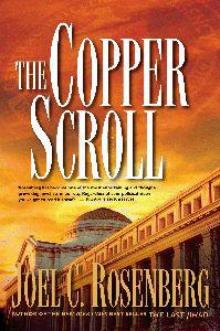 The Copper Scroll
The Copper Scroll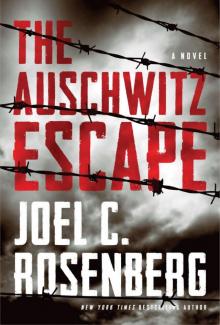 The Auschwitz Escape
The Auschwitz Escape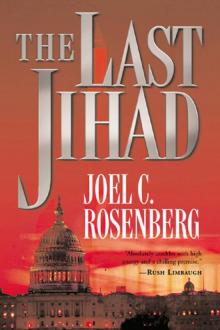 The Last Jihad
The Last Jihad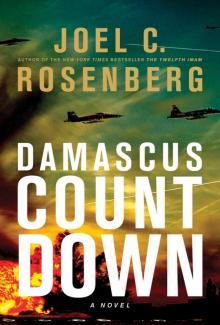 Damascus Countdown
Damascus Countdown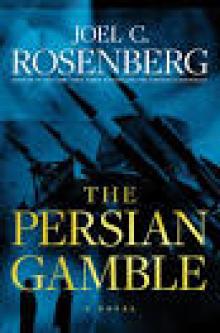 The Persian Gamble
The Persian Gamble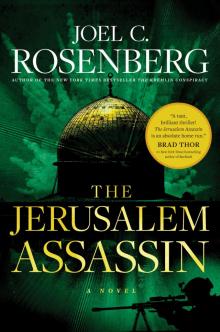 The Jerusalem Assassin
The Jerusalem Assassin Dead Heat
Dead Heat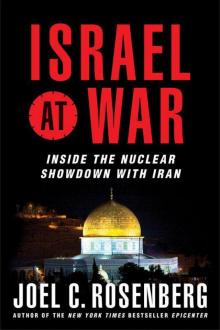 Israel at War: Inside the Nuclear Showdown With Iran
Israel at War: Inside the Nuclear Showdown With Iran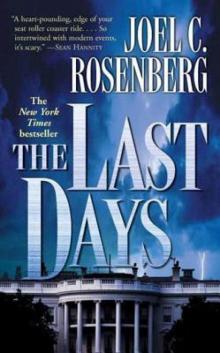 The Last Days
The Last Days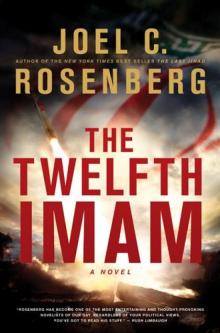 The Twelfth Imam
The Twelfth Imam Epicenter 2.0
Epicenter 2.0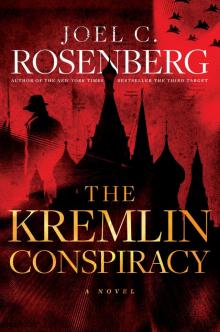 The Kremlin Conspiracy
The Kremlin Conspiracy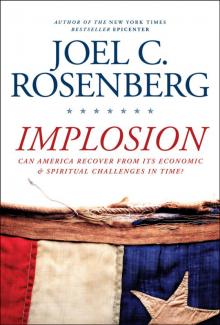 Implosion: Can America Recover From Its Economic and Spiritual Challenges in Time?
Implosion: Can America Recover From Its Economic and Spiritual Challenges in Time?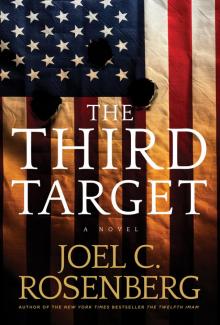 The Third Target: A J. B. Collins Novel
The Third Target: A J. B. Collins Novel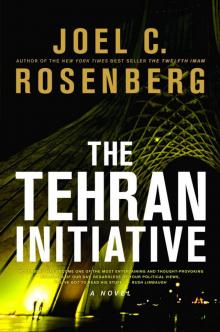 The Tehran Initiative
The Tehran Initiative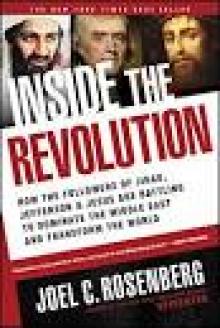 Inside the Revolution
Inside the Revolution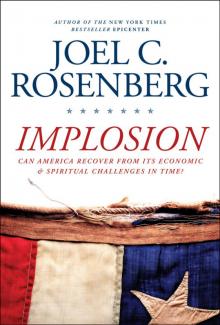 Implosion
Implosion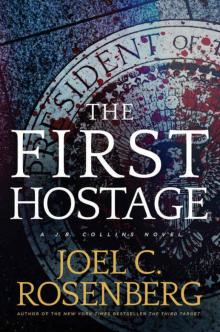 The First Hostage: A J. B. Collins Novel
The First Hostage: A J. B. Collins Novel